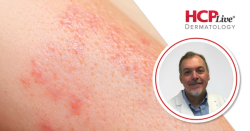
OR WAIT null SECS
FDA Approves Sirolimus Topical Gel for Facial Angiofibroma
This is the first topical treatment approved by the FDA for facial angiofibroma associated with tuberous sclerosis complex in adults and children 6 years and older.
Today, the Food and Drug Administration approved sirolimus topical gel (HYFTOR) 0.2% for facial angiofibroma in adults and children 6 years and older with tuberous sclerosis complex (TSC).
This is the first topical treatment approved by the FDA for facial angiofibroma associated with TSC.
Facial angiofibroma has been known to occur in 75-80% of patients with TSC, a genetic disorder that results in tumors in a variety of organs including the brain, eyes, heart, skin, and lungs. Facial angiofibroma has typically been defined by skin lesion caused by unregulated cell growth.
Approximately 50,000 people in the US alone have TSC, with an estimated 40,000 having TSC-related facial angiofibroma as well. Many of these cases have been diagnosed in children.
"TSC is a complicated disease, and facial angiofibroma is one more thing for both parents of children with TSC and adults with TSC to worry about," said Kari Luther Rosbeck, President & Chief Executive Officer of the TSC Alliance in a press release. "An FDA-approved topical treatment offers new hope for them, and the TSC Alliance is really pleased this treatment option is now available."
In clinical studies, sirolimus topical gel 0.2% had improved both the redness and size of facial angiofibromas in 12 weeks. Crucially, the topical medication was contraindicated in patients with a history of hypersensitivity to sirolimus or other gel components.
"The US approval of HYFTOR™ is a significant milestone for Nobelpharma. Not only is this our first FDA approval, but it is also the first ever FDA-approved topical treatment for facial angiofibroma associated with tuberous sclerosis complex," said Yoshiki Kida, President & CEO of Nobelpharma America. "This landmark approval will bring a much-needed therapy to people with tuberous sclerosis complex."


